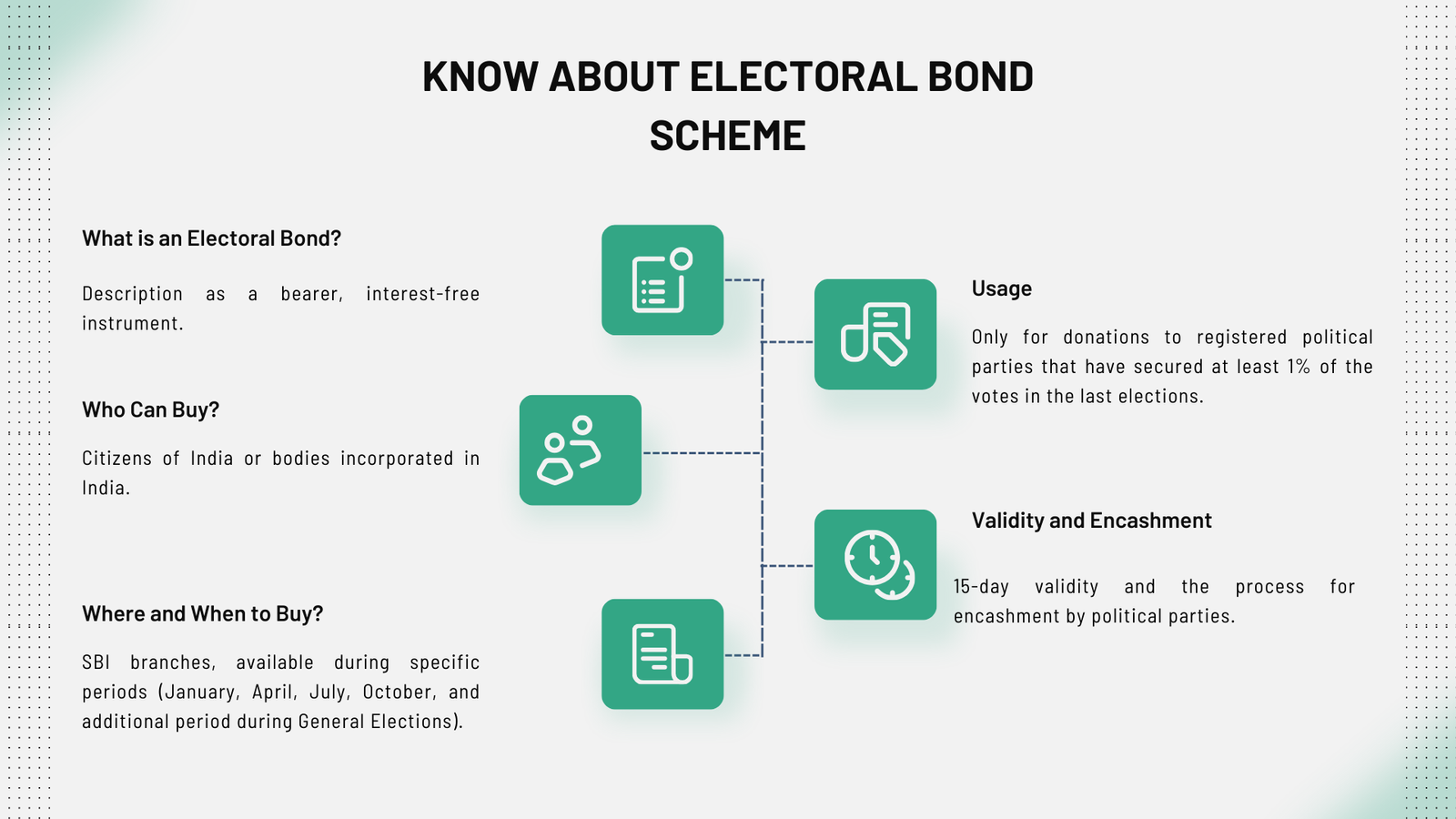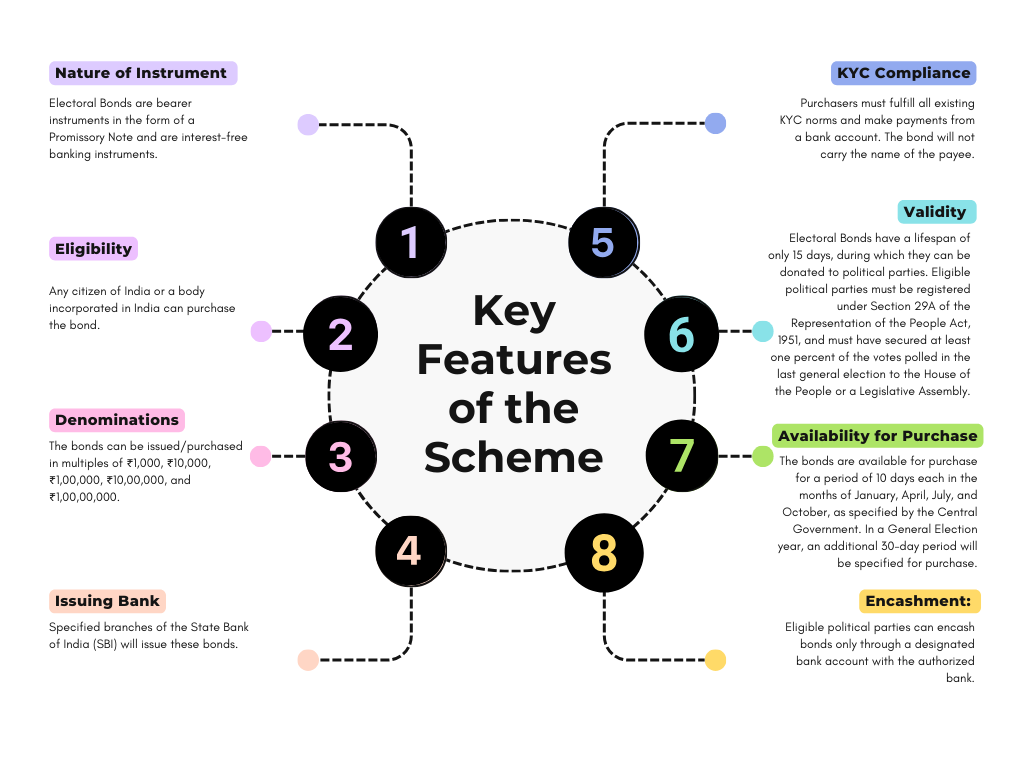The Election Commission of India (ECI) recently announced the schedule for the 2024 Lok Sabha elections, set to start on April 19 with results announced on June 4. The current term for the Lok Sabha ends on June 16, according to Chief Election Commissioner Rajiv Kumar.
Just before the election dates were announced, the Supreme Court issued a judgment striking down the electoral bond scheme introduced in 2017. This scheme had faced criticism from NGOs, citizens, and opposition parties over the years. The Court also ordered the State Bank of India (SBI) to release a list of donors, which led to new controversies. Media investigations showed that the BJP was the largest recipient of these funds, leading to allegations that donors received government contracts in return.


This decision has become a major topic for opposition parties, often discussed in rallies and manifestos, accusing the government of controlling media coverage on sensitive issues like this. Other controversies this election season include problems with EVM machines, raids by enforcement agencies, and the arrests of opposition leaders. However, issues of financial misconduct, especially related to the electoral bond scheme, continue to capture public attention. Despite its goal of making political funding more transparent, the scheme was found to have more negative impacts than benefits, which is why it was struck down. This topic is likely to remain a key issue throughout the election period. I aim to provide readers with straightforward and unbiased information on these developments.


Summary of the Electoral Bond Scheme Case with Event & Controversy
2017
- March: The electoral bond scheme is introduced by the Bharatiya Janata Party (BJP) government during the Union Budget presentation by Finance Minister Arun Jaitley.
2018
- January: The scheme officially comes into effect with the sale of the first batch of electoral bonds.
- February: SBI designated to manage the issuance and redemption of electoral bonds.
2019
- Finance Ministry overlooks RBI’s dissent: Despite RBI’s reservations about the scheme, the Finance Ministry moves forward, interpreting the RBI’s dissent as ‘indirect approval.’
- Controversies arise: Reports surface about BJP receiving donations from companies under investigation for serious offenses, raising questions about the transparency and ethics of the scheme.
2020
- Impact on donation transparency: Analysis shows a significant dip in transparent corporate donations, with major political parties receiving a large portion of their funding through electoral bonds.
2023
- Ongoing opposition and scrutiny: The scheme faces continuous opposition from activists, political parties, and civil society. Questions regarding its impact on the transparency of political funding are raised by various stakeholders, including the Election Commission of India.
- IAS officers push forward: Despite objections, the scheme is managed and promoted by government officials.
- Rise in unknown source income: Reports indicate a sharp increase in political parties’ income from unknown sources, contradicting government claims about the scheme’s benefits for transparency.
2024
- Dominance of BJP in corporate donations: The BJP reportedly receives almost 90% of all corporate donations to political parties, further highlighting concerns about the electoral bond scheme’s role in potentially skewing political competition.
- Government defense in Supreme Court: The Modi government defends the scheme as part of the secret ballot principle, asserting that it is a form of political self-expression.
February 15, 2024
- Supreme Court judgment: The scheme is struck down as unconstitutional by the Supreme Court, citing violations of the right to information and Article 19(1)(a). The Court mandates SBI to provide details of donations made through electoral bonds to the Election Commission, which must publish these details by March 13, 2024.
About The Case

Key Issues
- The constitutionality of the Electoral Bond Scheme and related legislative amendments that impact the transparency and funding of political parties.
- Whether unlimited corporate funding to political parties as allowed by the amendments violates Article 14 of the Constitution.
- Whether the non-disclosure provisions related to electoral bonds violate the right to information under Article 19(1)(a) of the Constitution.
1. Important Points Highlighted by the Supreme Court
- The Electoral Bond Scheme allows for anonymous financial contributions to political parties, raising concerns about transparency and potential for misuse in political financing.
- Concerns were raised about the potential of electoral bonds to undermine transparency and facilitate undue influence in political processes.
2. Sections or Articles Involved
- Article 19(1)(a): Relates to the right of freedom of speech and expression, under which the right to information is argued in the context of electoral financing.
- Article 14: Ensures equality before the law, invoked in relation to concerns about unlimited corporate donations creating inequalities in political influence.
- Finance Act Amendments: Several sections of the Finance Act that amended other laws like the Representation of the People Act, RBI Act, Income Tax Act, and Companies Act were challenged for facilitating non-transparent political donations.

3. Supreme Court’s Observations on These Amendments:
- Non-disclosure and Transparency: The Court was concerned about the amendments facilitating non-disclosure of contributions, which could undermine the transparency essential for a democratic political process. The amendments to Sections 29C of the RPA and 13A of the IT Act were particularly critical because they allowed political parties to receive contributions through electoral bonds without disclosing the donor’s identity, which poses a risk to the transparency of political financing.
- Unlimited Corporate Funding: The amendment to Section 182 of the Companies Act, which removed the cap on corporate contributions to political parties, was another point of concern. The Court discussed how this could lead to an unequal influence on political processes by wealthier corporate entities, thus potentially impacting the principle of equality before law as enshrined in Article 14 of the Constitution.
- Impact on Electoral Integrity: The changes brought about by these amendments were seen as potentially distorting the electoral competition by favoring parties that can attract more corporate funding, thereby impacting the fairness of elections.
- Right to Information: The amendments impacting Sections 29C of the RPA and 13A of the IT Act were discussed in light of the right to information under Article 19(1)(a). The Court considered how the lack of disclosure requirements for electoral bonds affects the voters’ right to be informed about the financial backers of political parties, which is essential for making informed voting decisions.
These observations reflect the Court’s stance on ensuring fairness, transparency, and equality in the electoral processes, indicating the necessity to balance corporate interests with democratic values.
4. Final Verdict
- The Hon. The Supreme Court struck down the electoral bond scheme as unconstitutional, citing violations of the right to information and Article 19(1)(a).
- The judgment highlighted significant concerns with the Electoral Bond Scheme and associated legislative amendments, focusing on issues of transparency, potential corruption, and the influence of unchecked corporate donations on the democratic process. The court’s directives aimed at addressing these issues indicate a push towards enhancing transparency and accountability in political financing.
Conclusion
The electoral bond scheme was aimed at reforming political funding by making it more organized and traceable through banking channels, but it faced significant criticism and legal challenges due to concerns about transparency, anonymous donations, and the potential influence of wealthy corporate entities on political processes. The Supreme Court’s decision marks a pivotal turn in addressing these issues.

